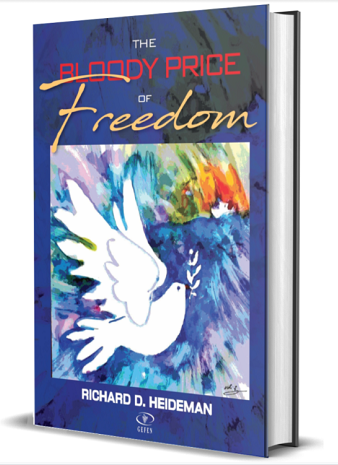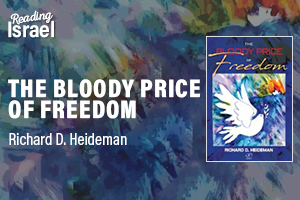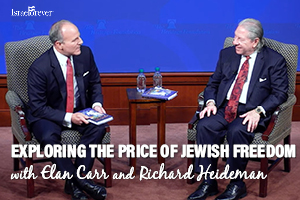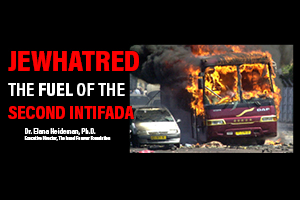The Bloody Price of Freedom: Book Review
By Joseph Tipograph

Just a few months after D-Day, as it became increasing clear that the Allied Forces would defeat the Nazis in World War II and bring an end to the Holocaust, a group of Arab dictators gathered in Cairo, Egypt to form the Arab League. Anticipating the potential impending realization of the Zionist dream to re-establish a Jewish state in the area then known as British Mandatory Palestine, the Arab League took a page from the Nazi playbook and launched a propaganda-laden boycott campaign seeking to isolate and stare out the Zionist entity that would eventually be known as the Jewish State of Israel.
The Bloody Price of Freedom starts out by tracking how this moment in history gave rise to Anti-Zionism, the surging form of anti-Jewish bigotry that pollutes academia, the media and international diplomacy today. The book examines how the Arab League brought its propaganda campaign to the United Nations, where it was successfully shaped into a foundation for prosecuting Israel at the largest international tribunals and in the court of public opinion.
Heideman’s manuscript then delves into the content of propaganda: the language that is used to wrongly malign and demonize Israel, the faulty premises upon which mountains of lies are built, and the accessible evidence that points readers towards understanding and being able to communicate to others the truth about the Arab-Israeli conflict. Among the topics covered are:
- Unpacking the falsehood that the Jews somehow stole the land of Israel from the local Arab community, through a detailed, comprehensive and evidenced-based historical account of political rights, land ownership, population changes, religious texts, and negotiations for land partition.
- Questioning the use of the term “occupation” to describe Israel’s presence in the West Bank, Gaza and elsewhere, with a textual analysis of the legal and reputational significance of the term.
- Analyzing the Palestinian refugee problem by examining how the unique definition of refugee in the Palestinian context compared to how the term is defined with respect to all other refugees around the world has only served to harm, disenfranchise and foster hatred and anger among the Palestinians, and thereby undermined prospects for regional peace.
- Deconstructing the accusation of Israel as a racist, apartheid, and criminal state, by contrasting the realities of apartheid, racism and religious intolerance in the very countries that level the accusation against the uniquely inclusive, open and tolerant society found in Israel.
- Addressing the Palestinian leaderships twin strategy of terrorism and rejectionism, and how it has shaken the confidence and openness of the Israeli public towards the prospects of peace.
- Examining all aspects of the International Court of Justice’s 2004 advisory opinion about Israel’s construction of a terrorism prevention security fence, including the flawed process by which the ICJ was engaged, the rampant misstatements of law and fact found throughout the opinion, the misapplication of the opinion in jurisdictions around the world and a detailed review of cases and maps in which Israel’s High Court ordered modifications to the fence out of consideration for Palestinian rights and well being.
Readers are then shown many of the ways that the propaganda has manifested both into policies, decisions, boycotts, diplomacy and violence against Jews and against Israel, but also against other groups and causes that have been impacted by the flawed applications of flawed precedents. The book then wraps up with concrete proposals for addressing the antisemitism and other societal harms that have flowed from the propaganda campaign, as well as a glimmer of hope for the future, as a growing segment of the Arab League’s membership is starting to normalize relations with Israel by virtue of the recently signed Abraham Accords.
I am proud to have been one of Richard’s research assistants contributing to the preparation of this manuscript. We aimed to provide readers with a clear and straightforward understanding of the indisputable facts about Israel, and the hard data and evidence that supports the narrative. As we often wonder what could have been done differently to prevent the persecutions of the past, this book aims to provide an accessible roadmap for all people towards preventing the persecutions of the future.

Recommended:
READING ISRAEL BOOK CLUB
Get Started Reading Israel today!
About the Author









